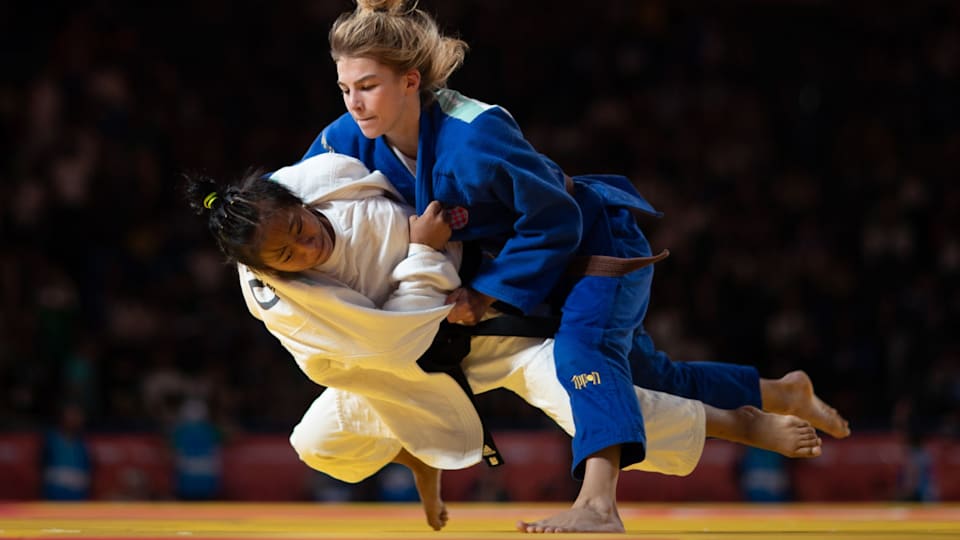Reward for India’s Thangjam as first judo medals are shared
Day one of the judo competition at Buenos Aires 2018 saw all 12 medals awarded go to 12 different countries. Among the recipients was India’s Tababi Thangjam, who won -44kg silver in a sport that she took up against her parents’ wishes.

There were two men’s and one women’s event on the programme on day one of the Youth Olympic Games Buenos Aires 2018 judo competition, which is being held at the Asia Pavilion.
Belarus’ Artsiom Kolosau claimed gold in the men’s -55kg, defeating Mongolia’s Temuujin Ganburged in the final. Ukraine’s Oleh Veredyba and Austria’s Daniel Leutgeb took the bronzes.
For Kolosau, one of the toughest aspects of the YOG so far has been trying to follow his coach’s advice to stay happy and relaxed during the competition.
“As you can see, I’m a very serious guy,” he said. “I’ve only been doing judo four years. I’m 17 now, so winning this medal is a dream.”
In the men’s -66kg category, Azerbaijan’s Vugar Talibov won gold, with Abrek Naguchev of Russia taking silver and Javier Pena Insausti of Spain and Dominican Republic’s Antonio Tornal the bronzes.
In the women’s -44kg event, meanwhile, Venezuela’s Maria Gimenez beat surprise package Tababi Thangjam of India, whose silver came as rich reward after years of arguments and secret training, as she fought to overcome her family's opposition to her becoming a judoka.
Growing up, Thangjam would regularly risk her parents’ wrath to improve her skills in a sport they insisted was “only for boys”.
“I would train in secret without telling them,” said Thangjam, 16. “When they first found out, they said that I wasn’t allowed. They would ask me, ‘Why are you doing judo? You might get injured. Study, or do anything but this.’
“Sometimes they tried to stop me, but I’d always run away. They would get angry, but I loved judo, particularly the fighting spirit.”
Thangjam regularly got caught up in street brawls as a young girl, but would invariably lose.
“I was a tomboy, always fighting with the boys, but I used to be so frustrated that I was so weak,” said Thangjam. “The boys would tease me, and even the girls would always beat me.
“But judo changed my life. I got stronger and suddenly everyone respected me. No one dared challenge me anymore, even the bigger boys.”
Her success in the sport has won over her family. Having won medals in a number of international competitions, including gold at the 2017 Asian Cadet Judo Championships, she now has their full support.
For her coach, Chingkheinganbi Huirem, a former national champion, Thangjam’s story has parallels with her own upbringing.
“I had to run away from my parents as well to do judo,” said Huirem. “This is common in many poor areas of India. As coaches, we have to convince parents that it’s good for girls. It teaches them self-defence and self-respect. But when they see the success of girls like Tababi, suddenly every parent wants their daughter to be like her.”
Some of the day’s most emotional scenes involved Kosovo’s Erza Muminoviq, as she claimed bronze in the women’s -44kg along with Croatia’s Ana Puljiz. It was Kosovo’s first medal at a Summer Youth Olympic Games, having only been granted full recognition by the International Olympic Committee (IOC) in 2014.
“It’s so emotional I can’t put it into words,” said Muminoviq. “This medal feels like a victory. We won an Olympic gold medal in our first judo competition in Rio, which was huge, and now I’ve gone and won an Olympic medal too. I think it will be a pretty big deal back home.”
“We’re a small country but we have a big heart,” said Kosovo National Olympic Committee member Memli Krasniqi. “Judo is our most important sport. All of Erza’s matches have been broadcast live back home today and many people will have been watching.”
